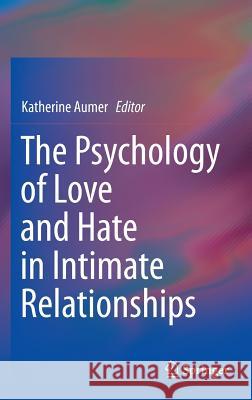The Psychology of Love and Hate in Intimate Relationships » książka
The Psychology of Love and Hate in Intimate Relationships
ISBN-13: 9783319392752 / Angielski / Twarda / 2016 / 184 str.
Social psychology has made great advancements in understanding how our romantic relationships function and to some extent, dissolve. However, the social and behavioral sciences in much of western scholarship often focus exclusively on the more positive aspects of intimate relationships--and less so on more controversial or unconventional aspects. The goal of this volume is to explore and illuminate some of these underrepresented aspects: aspects such as non-monogamy, female orgasm, sadism, and hate, that often function alongside love in intimate relationships. Ultimately, by looking at intimate relationships in this way, the volume contributes to and advocates for a more holistic and comprehensive view of intimate relationships. Throughout the volume, contributors from social, clinical, and evolutionary psychology cover love and hate from a variety of (sometimes opposing) perspectives. The first section, covers love and the changing landscape of intimate relationships. Its chapters review the current literature and research of understudied topics like non-monogamy, female orgasm, sexual fantasies, and the viewpoint of love as something other than positive. The second section explores hate and how hate can operate in intimate relationships--for example, the appearance of sadistic behavior and debates the nature of hate as either a motivation or emotion. The volume concludes, by looking at ways in which the appearance of hate in relationships can be dealt with and overcome successfully. Taken together, these two sections reflect the full variety of experiences within intimate relationships. With the aim of exploring how love and hate can-and frequently do-work together, The Psychology of Love and Hate in Intimate Relationships is a fascinating psychological exploration of intimate relationships in modern times. It is an invaluable resource to academics and students specializing in psychology, gender, and sociology, including clinicians and therapists, and all those interested in increasing our knowledge of intimate relationships.











